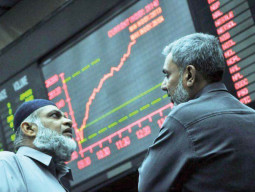
Pakistan has promised to make payments of Rs50 billion to four China-Pakistan Economic Corridor (CPEC) power plants early next week to save them from default and send a positive signal across the border ahead of a visit by Prime Minister Shehbaz Sharif.
The decision was made on Friday in a meeting attended by Pakistani and Chinese stakeholders. Finance Minister Miftah Ismail presided over the meeting, which was also attended by the heads of Chinese power producers.
The meeting discussed the outstanding payments to the Chinese IPPs in Pakistan and other hurdles faced by them, according to a statement issued by the Ministry of Finance.
An official said that it was decided during the meeting that the Power Division would pay Rs50 billion to four Chinese power plants in local currency instead of US dollar.
Power producers will buy US currency from the market and stagger their overseas payments aimed at putting minimum pressure on the rupee. The government may conclude the Rs50 billion transactions as early as Tuesday, said the official.
Despite making nearly 90% payments against the billed amount, Pakistan still owes Rs74 billion to Sahiwal power plant, owned by Huaneng Shandong Ruyi group.
Similarly, the government will have to make a total payment of Rs70 billion to Port Qasim power plant and another Rs32 billion to Engro Powergen plant. The outstanding amount in favour of Hub power plant stands at Rs65 billion.
The payment of Rs50 billion to the four plants will partially address their financial woes, as Pakistan has not yet been able to fulfill its promise of opening a bank account for saving the Chinese power plants from circular debt.
The financial condition of the Chinese power plants has deteriorated significantly due to delay in clearance of their dues, largely on account of idle capacity payments and partially on account of power purchase cost.
The government of Pakistan owes at least Rs269 billion to 12 Chinese power plants as of this week, according to officials.
The finance minister also gave instructions to give a clear roadmap to the Chinese producers for clearing all outstanding amounts by June next year.
However, the government of Pakistan has made similar promises in the past too. Just before his visit to Beijing in February this year, former prime minister Imran Khan authorised payments of Rs50 billion to the CPEC power plants.
He also promised to open a dedicated bank account to save the Chinese IPPs from circular debt. But it did not happen.
Sources said Prime Minister Shehbaz Sharif may also soon go to Beijing and the government was keen to send a positive message before his visit.
The finance minister expressed the resolve of the government to provide all kinds of facilities to Chinese investors, according to the official statement. He assured the Chinese IPPs that their concerns would be addressed and resolved immediately.
The minister also formed a technical committee comprising representatives of Finance and Power Divisions to address concerns of Chinese investors.
The IMF has asked Pakistan to first negotiate with the Chinese producers and seek a reduction in the return on equity, and extend the debt repayment period from the current 10 years before clearing their dues.
As a result, Pakistan has already given a written assurance to the IMF that it will “strive to reduce capacity payments, as we pay the arrears, either by renegotiating the PPAs [Power Purchase Agreements] or by lengthening the duration of bank loans”.
Pakistan also told the IMF that reimbursing high fuel prices resulted in the country falling behind in payment of capacity charges owed to the Chinese power producers.
However, a Chinese energy expert argues that the financial impact of negotiations and debt restructuring of CPEC power plants could be Rs10 billion – Rs50 billion annually.
He added that even to achieve this all involved international parties would have to change their guarantee or investment body, with limited effect in rupee terms.
According to the Chinese authorities, the IMF has neglected the loss sustained by power distribution companies whose financial impact was Rs500 billion annually.
Published in The Express Tribune, September 10th, 2022.
Like Business on Facebook, follow @TribuneBiz on Twitter to stay informed and join in the conversation.




1730959638-0/trump-(19)1730959638-0-165x106.webp)













COMMENTS (3)
Comments are moderated and generally will be posted if they are on-topic and not abusive.
For more information, please see our Comments FAQ